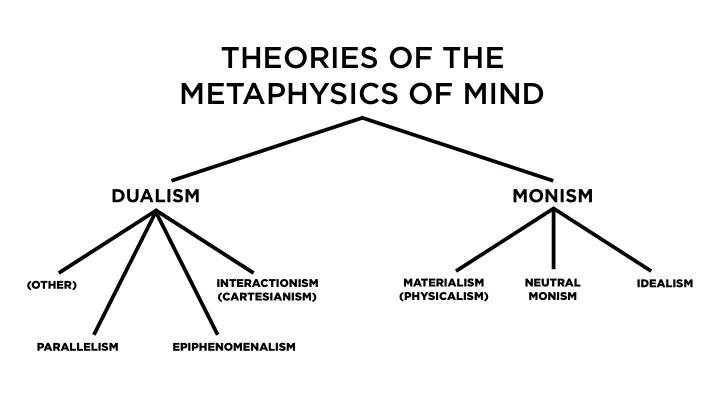

THEORIES OF THE METAPHYSICS OF MIND DUALISM MONISM MATERIALISM NEUTRAL INTERACTIONISM IDEALISM (OTHER) (PHYSICALISM) MONISM (CARTESIANISM) PARALLELISM EPIPHENOMENALISM
ANTI-DUALISM ARGUMENTS 1. Conflict with physical laws (7–9) 2. No explanation of mind–body causation (9–12) 3.Materialism is simpler (13–15) 4.(Others?) ANTI-MATERIALISM ARGUMENTS 1. Immortality! 2. Conflict with voluntarism 3.Something about blue experiences (??) (3–4) 4.(Others?)
THEORIES OF THE WILL INCOMPATIBILISM COMPATIBILISM VOLUNTARISM DETERMINISM
I will suppose, then, that everything I see is fictitious. I will believe that my memory tells me nothing but lies. I have no senses. Body, shape, extension, movement and place are illusions. So what remains true? Perhaps just the one fact that nothing is certain! … Hopeful: …how do I know that there isn’t something…about which there is no room for even the slightest doubt? Isn’t there a God (call him what you will) who gives me the thoughts I am now having? Doubtful: But why do I think this, since I might myself be the author of these thoughts? Hopeful: But then doesn’t it follow that I am, at least, something? Descartes, p.4
Doubtful: But there is a supremely powerful and cunning deceiver who deliberately deceives me all the time! Hopeful: Even then, if he is deceiving me I undoubtedly exist: let him deceive me all he can, he will never bring it about that I am nothing while I think I am something . So after thoroughly thinking the matter through I conclude that this proposition, I am, I exist , must be true whenever I assert it or think it. Descartes, p.4
Well, then, what am I? A thing that thinks. What is that? A thing that doubts, understands, a ffi rms, denies, wants, refuses, and also imagines and senses. Descartes, p.5
The Knowledge Argument 1. It is possible to know all of the physical facts about an experience (e.g., of seeing the color red) without knowing what it is like to have the experience. 2. If you then have the experience, you would learn something new (e.g., what it is like to see red). 3. So, at least some knowledge is knowledge of non - physical facts. (See, e.g., Frank Jackson, “What Mary Didn’t Know”)
QUESTION: How could our conscious experiences be made out of physical stuff?
Consciousness poses the most baffling problems in the science of the mind. There is nothing that we know more intimately than conscious experience, but there is nothing that is harder to explain. —David Chalmers, ‘Facing Up to the Hard Problem of Consciousness’
The easy problems of consciousness include those of explaining the following phenomena: • the ability to discriminate, categorize, and react to environmental stimuli; • the integration of information by a cognitive system; • the reportability of mental states; • the ability of a system to access its own internal states; • the focus of attention; • the deliberate control of behavior; • the difference between wakefulness and sleep. —David Chalmers, ‘Facing Up to the Hard Problem of Consciousness’
The really hard problem of consciousness is the problem of experience. —David Chalmers, ‘Facing Up to the Hard Problem of Consciousness’
As [Thomas] Nagel has put it, there is something it is like to be a conscious organism. This subjective aspect is experience. —David Chalmers, ‘Facing Up to the Hard Problem of Consciousness’
When we see, for example, we experience visual sensations: the felt quality of redness, the experience of dark and light, the quality of depth in a visual field. Other experiences go along with perception in different modalities: the sound of a clarinet, the smell of mothballs. Then there are bodily sensations, from pains to orgasms; mental images that are conjured up internally; the felt quality of emotion, and the experience of a stream of conscious thought. What unites all of these states is that there is something it is like to be in them. —David Chalmers, ‘Facing Up to the Hard Problem of Consciousness’
QUALIA
It is widely agreed that experience arises from a physical basis, but we have no good explanation of why and how it so arises. Why should physical processing give rise to a rich inner life at all? It seems objectively unreasonable that it should, and yet it does. —David Chalmers, ‘Facing Up to the Hard Problem of Consciousness’
Recommend
More recommend